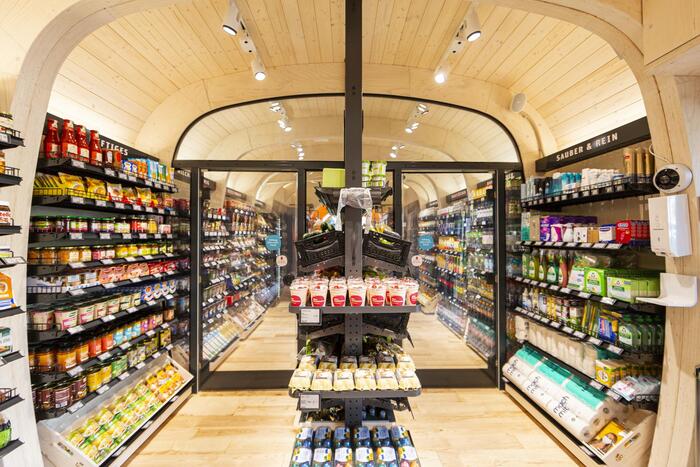They are located in strategic places: airports, terminals, offices, gas stations... even in waiting rooms of any hospital.
There, where boredom arrives faster than hunger and where healthy gastronomic offers are scarce, expensive or non-existent, the vending machines shine
with
all kinds of drinks and
snacks
to snack on or eat at any time.
Illuminated, refrigerated, and packed with choices, the food vending machines feel like oasis in the desert.
But they do not offer as much variety as it seems, nor do they allow us to know what all that shines on the other side of the glass is made of.
When we choose a product in these machines, we do it blindly.
There is no way to consult the ingredients or nutritional information before buying, because these data -mandatory- are usually printed on the back of the packages, which is not visible.
This is a serious problem for people who have food allergies or intolerances, who need to read the list of ingredients to verify that the chosen product does not contain allergens or substances that harm them.
And it is also a problem for the general population that, beyond milk, traces of nuts or gluten, has the right to choose knowing what to buy.
More information
Unhealthy food in hospital vending machines
Is it legal to sell a food without offering the possibility of previously consulting the nutritional information about it?
"It's legal," replies Francisco José Ojuelos, an expert lawyer in food law.
“It is because you see that information when you pick up the product.
The European regulation on information provided to the consumer establishes that it is enough for these mandatory labeling mentions to be present at the time of delivery, and this is fulfilled, although, of course... after paying”.
After paying and without immediate possibility to return the product and get the money back.
For Ojuelos, who is also a professor of Legislation and food policy at the Miguel de Cervantes European University, " vending
machines
are a hybrid model between physical sales, because you are in front of the product, and remote sales, because you cannot examine until it is yours.”
Therefore, "regulation should be improved and adjusted to this scenario", in such a way that nutritional information and the list of ingredients are available and visible, instead of being near and far at the same time as now.
In the brilliant orchards of
snacking
, products and data are paid.
ultra-processed dispensers
The other thing that could be improved, in the opinion of health professionals, is the content of these machines because, for the most part, they sell unhealthy products.
This is indicated by numerous investigations, which even define them as an obesogenic factor (because they are loaded with products rich in calories, sugar, saturated fats or salt), and this is confirmed by dietitian-nutritionist Borja Caballero, one of the promoters of the initiative
Changing the vending
, which emerged in 2017 at the Pablo de Olavide University.
“The idea was born when we created the Association of University Dietitians-Nutritionists of Seville because we saw the problem there, in our own faculty.
Every time we wanted to drink or eat something, 95% of what we found in the machines were ultra-processed," he says.
We decided to focus on this phenomenon, see if it happened in other places, analyze the offer and try to promote a change for the better”.
There were no pleasant surprises.
After visiting almost thirty places and evaluating 240
vending
machines , the team found that "usually they were full of unhealthy food."
What's more, Caballero explains that they designed a scoring system that went from one to ten to assess the food supply of these machines and that the average scores were very low;
“even below one″.
Food and drink vending machine in an office in Madrid.MOEH ATITAR
Changing the
vending
is no longer active, but it left you a few experiences.
Among them, the opportunity to meet with representatives of the sector, such as the company that managed the vending machines at his university or the Spanish National Association of Automatic Distributors (ANEDA).
In those meetings, the then students made proposals for improvement, although Caballero admits that without success: "In some cases they put fruit in some rows, or they reformulated the products to improve them a bit... But, in the end, it was trying to sell slightly improved versions of ultra-processed and continue promoting
snacking
.
Of real change, nothing”.
"This cannot be changed"
Borja Caballero still remembers the arguments they were given to keep the content of the
vending machine
as it was.
There were three: "we sell what people buy, it is not profitable to put fresh fruit and we are a very small percentage of the global food supply."
“The first thing is a fallacy, because it can also be said that people buy what is for sale and, furthermore, the demand for something does not legitimize the offer,” he rebuts.
Regarding the second, I believe that in public spaces, such as a hospital or a university, profitability cannot be central.
There the health of the population must prevail, not the financial health of the companies.
And as for the third… that other bigger businesses do it badly does not justify that you do the same”.
The vending
sector
, although smaller than others, is not small.
In Spain there are more than 500,000 vending machines and their turnover is over 2,450 million euros per year.
In other words: it is an industry that has a consolidated and widespread presence in our country, and that moves about 7 million euros a day.
Why don't you offer better food?
Is there any technical impediment to fill these fruit machines?
“The main reason why fruits and other healthy snacks, such as cherry tomatoes or similar, are not included is the shelf life.
An apple spoils much sooner than a chocolate palm tree”, says Miguel Ángel Lurueña, PhD in Food Science and Technology.
To this we must add other reasons, "such as the price, which may seem expensive compared to the low cost of ultra-processed products or what a piece of fruit costs in a store," he adds.
The problem is that, in general, where there are machines there are no greengrocers, no affordable restaurants, and no stores with better offers.
The main victory of
vending
is that it is located in spaces where we are governed by emotions and where there is no room for a plan B. "For example, the machine in a sports center, which offers us a prize or reward after having exercised during a hour;
or the machine that is in a hospital, which offers us products in difficult moments, such as when we accompany a loved one who is hospitalized”, says Lurueña.
Limit the domain of the queens of the wasteland
Biscuits, sweets, salty snacks, sugary drinks, chocolate bars, industrial pastries... Vending machines
offer
many versions of the same thing —ultra-processed products with no nutritional interest—, they modify the food landscape, they dominate spaces where competition is limited and where we are, therefore, captive diners.
“In addition, they encourage the consumption of unhealthy food and transform the food supply in an environment where we are already overconsuming.
In the vast majority of places where there are machines, there should not be them because they are places where there is no need to consume”, observes Maria Manera Bassols, dietitian-nutritionist at the Public Health Agency of Catalonia.
With this premise, in February of this year a mandatory instruction was approved to regulate both the presence of these machines and their offer in the healthcare field of Catalonia.
"This was demanded by health professionals from primary care centers, who saw how they recommended dietary guidelines in consultation and, when leaving, the patients found themselves face to face with the opposite offer," explains Manera.
From now on, "at least 75% of the products that the vending machines
located
in these spaces have must meet nutritional criteria and must also indicate from the outside if they contain gluten", details the nutritionist.








